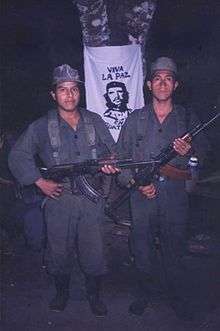Revolutionary Organization of Armed People
Revolutionary Organization of the People in Arms (ORPA)(Spanish: Organización Revolucionario del Pueblo en Armas) was one of the four groups of armed resistance during the Guatemalan Civil War.
| Revolutionary Organization of Armed People | |
|---|---|
Organización Revolucionario del Pueblo en Armas Participant in Guatemalan Civil War | |
.jpg) | |
| Active | 1979-1996 |
| Leaders | Rodrigo Asturias |
| Area of operations | Guatemala |
| Part of | URNG |
| Allies | PGT MR-13 FAR EGP U.S.S.R. (Until 1991) Cuba FMLN Nicaragua (1979-1990) |
| Opponent(s) | Guatemala U.S. (Support) Israel (Support) Taiwan (Support), Others |
| Battles and war(s) | Guatemalan Civil War |
In the 1970s, a new organization installed itself in the mountains and the forests above the coffee estates. The Revolutionary Organization of Armed People (ORPA) was started by local youth and university intellectuals. Of the various Guatemalan guerrilla groups, ORPA seemed the least violent, partly because it was led by the urbane Rodrigo Asturias, the son of Miguel Ángel Asturias, Guatemala's Nobel Laureate in literature. ORPA was also a group to which, with a few horrifying exceptions, the army did not respond with its trademark village massacres. Why this was so is an interesting question. One possibility is ORPA's decision not to organize villages as publicly declared support bases. Another possible explanation is that planters needed their workers' labor too much for the army to slaughter them en masse.
